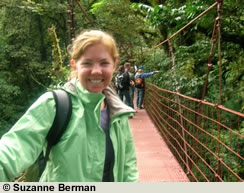Vol 8 Issue 1SectionsPriorities This IssuePrioritiesAfter Easter: Hope, and Happy Birthday!>> Extended Interview with Rev. Dr. Michael Kinnamon>> The Text, Webster, and Intuition>> TransitionsAnother Really Big Fish Story>> TraditionsEaster, Hope, and “Happy Birthday!”>> “Children, Have You Any Fish?”>> Wisdom & WonderingI am going out to fish>>
|
ArchivesBackpacking Beyond-the-Bible-Belt the Series:
Love thy neighbor. The idea is simple enough. The concept is accepted as a founding tenet of Christianity. The words are recited in Sunday school classes and kindergartens worldwide. So why is it that spiritual, strong and healthy adults forget one of God’s greatest commandments? The first of my destinations is Costa Rica, a modern-day Eden. A place where lush rainforests fold neatly into tropical beaches, and the peaceful locals welcome scores of American gringos every year. But this is a divided paradise. Iron gates separate front porches from the city streets, doors are always locked and bars shield the windows from possible intruders. In a country that feels so secure that it lacks an army, one might ask, what are the Costa Ricans so afraid of?
As a result, Nicaraguans cross into Costa Rica in search of safety and opportunity. But violent incidents by Nicaraguans combined with Costa Rican xenophobia have created a rift between the two nations. I found myself hesitant to “admit” that I had learned Spanish while volunteering at an orphanage outside of Managua. I heard repeated tales of crimes and threats by Nicaraguans, and I remained silent, assuming that the truth lay somewhere between the various versions of the story. At a time in history when a new conflict rages in the Middle East, terrorism is a constant threat, and genocide continues in areas such as Darfur, I have to ask myself, how can countries and communities with strong faith fall victim to the epidemic of neighborly hatred? Neither God, Yahweh, Jesus, Allah, Buddha nor any guru would ever say loathing is good for spiritual health. What happened to being able to see outside-our-own-selves? As Christians, we must ask ourselves an important question: Where is it that our spiritual education falters and neglects the ever-important concept of Christian love?
Mission trips, which do well to expose relatively wealthy Christians to the realities of world, rarely put the community they serve into the context of that particular nation and the world as a whole. Bible studies may ask: How can we serve these people? How can we be charitable? How can we show God’s love and Christ’s salvation? But it is more difficult to find a Bible study that asks these questions: Why are these people in these circumstances? What injustices have historically occurred here? What injustices continue to exist? What can we do, as individuals, as a church, as a nation to correct them?
The world is unfair. That is inarguable. But as Christians, we should be more concerned with the fact that the world is unjust. As Christians, we should be accustomed to the concept of unfairness. Many of Jesus` miracles were done unto people or under circumstances that did not “deserve” their salvation by the cultural standards of His time. Furthermore, Grace is by definition unfair. Nothing man nor woman does deserves such salvation; it is the ultimate act of love, and an idea that changed the world. We should teach not only our children but also ourselves that to truly follow Jesus, we cannot merely be giving. We must also be loving. To give is easy. It implies that the action is done once, or a set number of times. It can make the donor feel good or “look good,” and for that reason, it can even be a selfish act.
Costa Rica is just the beginning of this journey. To be truly loving forces us to swallow our pride, quiet our fears, dispel others` rumors, open the gates, unlock the door and invite our neighbors inside our hearts as well as our homes. And when we do this, we must take the opportunity to ask them to make themselves comfortable. We need to ask our neighbors to remove their shoes, so that we might wear them for awhile. © 2006 ecumininet online! Spiritual Systems, Inc. | View
for Printing
|
| All Content Copyright © 2008 ecumininet online!, Spiritual Systems Inc. - Site Design & Maintenance By Atomic Pixels | ||

 For the next six months, I will fulfil a lifelong dream of backpacking
around the world. This column is dedicated to what I’ve
seen, experienced and learned. My first stop is Costa Rica.
For the next six months, I will fulfil a lifelong dream of backpacking
around the world. This column is dedicated to what I’ve
seen, experienced and learned. My first stop is Costa Rica. In large part, they are afraid of the Nicaraguans, their immediate
neighbors to the north. Unlike Costa Rica, which is one of the
wealthiest nations in Central America, Nicaragua has a history of political
and economic oppression. This history, combined with its lack
of effective infrastructure, makes it a destination for humanitarian
missions, but not for economy-boosting tourism.
In large part, they are afraid of the Nicaraguans, their immediate
neighbors to the north. Unlike Costa Rica, which is one of the
wealthiest nations in Central America, Nicaragua has a history of political
and economic oppression. This history, combined with its lack
of effective infrastructure, makes it a destination for humanitarian
missions, but not for economy-boosting tourism. I believe that the gap arises somewhere between adolescence and adulthood,
in the time when we must begin to be self-sufficient. We forget that
we must also care for our global neighbors as well. In my experience,
youth groups are successful at focusing on the threats of alcohol,
drug abuse and sexual activity, but are not as effective at maintaining
a global perspective of God’s people.
I believe that the gap arises somewhere between adolescence and adulthood,
in the time when we must begin to be self-sufficient. We forget that
we must also care for our global neighbors as well. In my experience,
youth groups are successful at focusing on the threats of alcohol,
drug abuse and sexual activity, but are not as effective at maintaining
a global perspective of God’s people.  Most conflicts in the world now occur within the political borders
of a country, or with a nation’s immediate neighbor. Whether
the definition of “neighbors” is this literal or whether
the term takes on a more global definition, the fighters of modern
clashes almost always represent the “haves” versus the “have-nots.”
Most conflicts in the world now occur within the political borders
of a country, or with a nation’s immediate neighbor. Whether
the definition of “neighbors” is this literal or whether
the term takes on a more global definition, the fighters of modern
clashes almost always represent the “haves” versus the “have-nots.”  “To love,” however, is an entirely different sort of
commandment. Truly loving, as a parent loves a child, as a husband
loves a wife, or as God loves us, is infinitely more difficult, more
painful, and more necessary. It is eternal. It is the most
active of all verbs, forcing us to respond not only with our wallets,
but with our bodies, minds and souls.
“To love,” however, is an entirely different sort of
commandment. Truly loving, as a parent loves a child, as a husband
loves a wife, or as God loves us, is infinitely more difficult, more
painful, and more necessary. It is eternal. It is the most
active of all verbs, forcing us to respond not only with our wallets,
but with our bodies, minds and souls. 